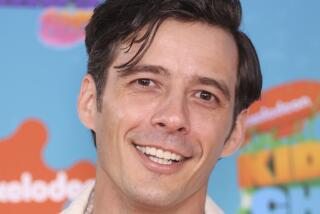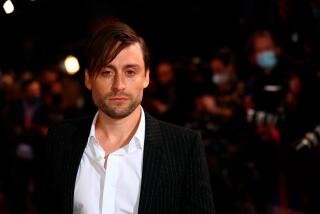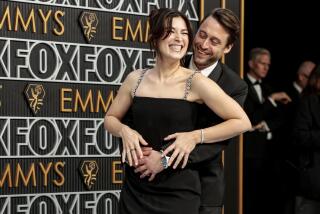Michael Kelly on doing what was necessary to protect the legacies of ‘House of Cards’

Michael Kelly talks about his “House of Cards” character Doug Stamper and his complicated relationship with Frank Underwood.
Some actors become so associated with their roles, they fool the public. David Ogden Stiers didn’t really speak with the stuffy erudition of Maj. Winchester on “MASH”; Manny Jacinto, who plays lovable dummy Jason Mendoza on “The Good Place,” holds a degree in applied science in civil engineering. And Michael Kelly, who played grimly efficient presidential fixer Doug Stamper on Netflix’s “House of Cards,” isn’t really an emotionless killer.
“There’s always somebody who’s caught off-guard, on their phone, and it’s like — ” Kelly becomes the bystander, looking up, startled and frightened just a little. Kelly laughs at the memories: “That moment of, ‘Oh my God, am I really standing next to this nut job?’ ”
The actor who played the “nut job” is, in person, unrecognizably … nice. Kelly is all smiles and laughs, laying laurels at the feet of costar Robin Wright, whom he points out directed more episodes of the show than anyone else; he praises the writers for adjusting to catastrophe on the fly; he speaks warmly of the crew in Baltimore. The three-time Emmy nominee dropped by the Los Angeles Times video studio for a (spoiler-filled) Emmy Contenders chat about his series-long run as the struggling-but-determined Doug.
WATCH: 2019 Emmy Contenders video chats »
That dogged determination might be “why there’s that sense of people wanting to root for this character sometimes, even though he’s doing these sometimes-heinous acts,” he said. “I had to believe that he was a good person. That he was doing what he believed was the right thing.”
Doug was expert at coercion, but didn’t stop there: He murdered the woman he came closest to loving. In his central drive to protect the legacy of President Francis “Frank” Underwood (Kevin Spacey), he became fierce rivals with First Lady and later President Claire Underwood (Wright). And he did it all with an external coldness, an unnerving lack of emotion Kelly says was part of series creator Beau Willimon’s plan from the start. The actor agreed that Doug’s addictive personality was central to who he was.
“100%,” said Kelly. “Everything for him is centered on addiction. Work and alcohol and women. Every aspect of his life, anything that he does, he does with full force and dedication.”

His greatest addiction was to Frank, to whom Doug remained loyal even through the final season story permutations forced by the firing of Spacey due to allegations of sexual misconduct.
“It was tough. It was tough,” Kelly said. “I’d say I went to a bit of a, especially when the news first broke, a bit of a dark place, myself. You know … ‘What’s going on?’ How do you — as an actor, as a person, as everything — deal with what’s happening? I guess I’m very thankful that … my focus very quickly shifted to that crew.”
He alluded to the lack of production in Baltimore, his closeness to the crew and the other legacy to protect — that of the series that kicked off the streaming era.
“How do you let this flagship show die because of one person’s actions? That became something to me that was unacceptable: ‘We can’t not finish this show.’ … I called Robin and I said, ‘We’ve gotta ...’ and she said, ‘I’m on it.’ ”
Doug proved loyal most of all to the legacy of what he’d built with Frank, which drove some of his most extreme actions.
“And when it all starts to go at the end, he can’t grapple with that. He can’t handle what’s happening. And how Claire is willing to just let it all go, and be like, ‘No, he wasn’t. And he had nothing to do with why I am who I am.’ And that, to Doug at the end, is the biggest dagger.”
The entire season having streamed months ago, Kelly felt free to discuss the revelation that it was Doug who killed Frank between Seasons 5 and 6 (which the actor didn’t learn until very late in the final season), and what was going on in Doug’s head as he confronted Claire in the series’ climactic moments.
“He goes into the Oval Office saying, ‘Here’s everybody who wants you dead. And all I want is the pardon for Frank. That will protect the legacy of this man. The pardon will protect it.’ She says no. And he’s willing to even settle for ‘Just say that he made you. Just admit that you are who you are today because of Frank Underwood.’ And she’s like, ‘… no.’
“And at that point, it’s like, everything — his whole world as he knows it just crumbled around him. He’s admitted to killing [Frank]; what does he have left? He knew that going in — at least, I had to play that as the character: I knew going in that I had one of three outcomes.
“That was probably the most challenging day of work that I had, over the course of those six years.”
To see the full interview, watch the video below.

More to Read
From the Oscars to the Emmys.
Get the Envelope newsletter for exclusive awards season coverage, behind-the-scenes stories from the Envelope podcast and columnist Glenn Whipp’s must-read analysis.
You may occasionally receive promotional content from the Los Angeles Times.







